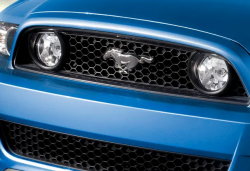
— Breanna Bumgarner of West Virginia was killed in a Ford Mustang crash which led to a $7 million jury award against Ford, an award that has now been reversed by an appeals court.
In 2016, Breanna Kristen Bumgarner, 19, was driving a 2014 Ford Mustang in Roane County, West Virginia at about 57 mph when an oncoming 1989 Toyota pickup truck traveling 62 mph left the narrow two-lane road, overcorrected, crossed the center line and slammed into the driver's side A-pillar of the 2014 Mustang.
The crash resulted in the Mustang catching fire, killing Bumgarner.
The crash and death of Bumgarner caused Bumgarner's mother to sue the 16-year-old female driver of the Toyota truck and the driver's mother and father.
Also included in the lawsuit was Ford, allegedly because the 2014 Mustang was defective.
Even though it was the 16-year-old driver of the Toyota truck who lost control and caused the pickup to slam into Bumgarner's Mustang, a West Virginia jury found Ford was 99% liable for the death of Breanna Bumgarner.
Why?
Lawyers for the plaintiff convinced the jury the Ford Mustang had a brake fluid reservoir that was not protected good enough to prevent brake fluid from leaking and allegedly causing the fire. And the lawsuit alleges it was the fire that killed Bumgarner.
Lawyers for the plaintiff also told the jury that Ford allegedly used the wrong steel to build the Mustang occupant compartment.
And the driver of the Toyota pickup that slammed into the Mustang? The jury found she was only 1% at fault.
Ford's Arguments
Ford argued Bumgarner was killed because the Toyota truck crossed the center line and violently slammed into Bumgarner's Mustang.
The evidence showed the closing speed of the two vehicles was more than 100 mph which caused nearly four feet of crush in the front of the Mustang.
And while lawyers for the plaintiff argued the Mustang occupant compartment was defective because it allowed too much crush, experts for both sides admitted the need for vehicles to deform as a means to manage crash forces.
According to Ford, in a frontal crash these forces are “easier to manage” because the crash engages the “majority of the frame structure.”
However, in the Mustang crash, Ford argued the 100 mph closing speed and 40-degree angle of impact created “very excessive forces."
This allegedly allowed the Toyota truck to override the Mustang’s structure and the Mustang had to manage and absorb far more of the energy in the crash.
Ford also told the jury how Bumgarner had no chance of escaping the burning Mustang because the driver's door was completely jammed after the 3,500-pound Toyota truck slammed into the driver-side door hinge pillar at an angle.
Ford also explained to the jury how the National Highway Traffic Safety Administration performed crash testing on the 2014 Ford Mustang and awarded the car an overall safety rating of 4 stars out of a possible 5 stars.
The automaker further told the jury there has never been a crash test similar to the real-world crash that killed Bumgarner.
Ford argued the Bumgarner Mustang was hit at the driver-side hinge pillar at an angle of 40 degrees, a completely different crash scenario than any previous 2014 Mustang crash test.
Following the $7 million jury verdict, Ford appealed to a West Virginia appeals court by arguing the "evidence at trial was legally insufficient to sustain the verdict, or alternatively, that it was entitled to a new trial as to the brake fluid reservoir claim and allocation of fault."
According to the appeals court, Ford deserves a new trial because negligent design claims about the brake fluid reservoir require proof of a reasonable alternative design for the reservoir.
"For the reasons mentioned below, this Court concludes that an alternative feasible design is required for a negligent design products liability claim in West Virginia. Therefore, this Court reverses the September 29, 2022, order entered by the Circuit court of Kanawha County and remands this case for a new trial." — West Virginia Intermediate Court of Appeals




